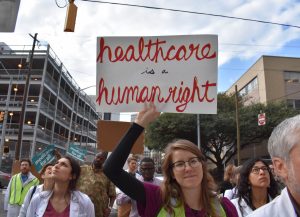This article was originally published in the Kirksville Daily Express. You can read the article here.
By Jessica Karins
“We are all just a layoff away from being among the ranks of the uninsured.”
– Wendell Potter
 In 2007, Wendell Potter was one of about 20 health care executives sitting in a conference room waiting anxiously for a report from a representative they had sent to Cannes Film Festival. A documentary was screening at Cannes which the executives knew might be an all-out attack on their public image.
In 2007, Wendell Potter was one of about 20 health care executives sitting in a conference room waiting anxiously for a report from a representative they had sent to Cannes Film Festival. A documentary was screening at Cannes which the executives knew might be an all-out attack on their public image.
The documentary was Michael Moore’s “Sicko,” and it would change the way Potter saw his work for the health insurance industry.
“Our worst fears were realized,” Potter said.
Potter came to Truman State University’s campus for an event sponsored by Truman’s economics department and the A.T. Still University organization Students for a National Health Program. SNHP is a student branch of the advocacy group Physicians for a National Health Program, a group of doctors who argue for ending America’s private insurance system and shifting to a single payer, or “Medicare for All” system.
Potter worked for years in corporate communications for health care companies, ultimately heading the department for insurance giant Cigna.
“I was a staunch believer and supporter of the free market,” Potter said.
Potter said his job was to convince the public that private insurance was the most beneficial system for health care. In the early 2000s, he said, that job largely consisted of moving consumers to high-deductible plans which the industry called “consumer-driven care,” meaning people would pay more up front for their health care costs before insurance coverage began.
Potter said his process of changing his mind about the health care industry began when he saw that Michael Moore documentary and realized the film’s portrayal of health care executives as greedy and heartless was not inaccurate to his experiences.
“He took a great deal of pains to make sure that he was portraying the system really very accurately,” Potter said.
As Potter pondered what to do next, a high-profile case hit the media. A 17-year-old girl, Nataline Sarkisyan, had been denied by his company a liver transplant her doctors said was medically necessary. Her parents were interviewed on CNN and staged a protest outside Cigna’s headquarters.
Potter said he convinced the company’s executives to reverse their decision.
“The problem was that days had passed. That liver was no longer available,” Potter said. “Five days before Christmas, Nataline died.”
Potter quit his job in 2008 and is now a writer who travels the country advocating for a single payer health care system. He said the Affordable Care Act has helped the problem slightly, but it is not enough.
“We are all just a layoff away from being among the ranks of the uninsured,” Potter said.
Like Potter, PNHP supports a proposal they call “expanded and improved Medicare for All.” They support a bill first introduced in Congress in 2003, House Resolution 676, which would create a national system of full health insurance including dental, vision and mental health coverage.
The cost of creating such a system in the United States is debated by economists, but PNHP believes it would save money.
“Single payer national health reform would save nearly $500 billion annually on paperwork and administration, enough to cover all of the uninsured and to eliminate deductibles, co-insurance, and co-pays for everyone,” according to the organization’s website.
Dr. James Adams, the faculty sponsor of SNHP at ATSU, said medical students are concerned about the future of health care under America’s current system.
“Once they graduate, it’s their system, and they know the current system is in crisis,” Dr. Adams said.
According to data from Gallup Polling, about 44 million Americans are uninsured and an additional 38 million are under-insured, meaning their insurance cannot cover their actual medical costs.
Most other Western countries have a single payer health care system. A national poll by Kaiser Health in 2008 found that 59 percent of physicians supported a single health care system, and Dr. Adams said that number has likely risen since then. Recent Gallup polling shows that 70 percent of Americans overall now support it, including a majority of Republicans.
Dr. Adams said physicians spend a large amount of time, money and emotional energy negotiating with health care companies that do not want to cover their patients’ costs.
“The insurance companies throw down all these barriers to patients,” Dr. Adams said. “Passing a Medicare for All system would buy our patients freedom from all that.”
Dr. Adams said SNHP tries to focus on the positives of a potential single payer system, rather than the negatives of the current insurance system. He said it would mean the end of paying for costs like pharmaceutical drugs, ambulance rides and nursing home care.
“No more premiums, no more copays, no more coinsurance, no more deductibles,” Dr. Adams said. “People would be out in the street demanding it if they really knew.”
